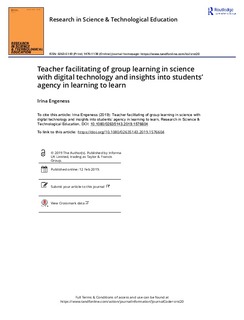Teacher facilitating of group learning in science with digital technology and insights into students’ agency in learning to learn
Journal article, Peer reviewed
Published version
Permanent lenke
http://hdl.handle.net/11250/2598112Utgivelsesdato
2019-02-12Metadata
Vis full innførselSamlinger
Sammendrag
The study provides an insight into how teachers may facilitate students’ group learning in science with digital technology, which was examined when Norwegian lower secondary school students engaged in learning concepts of mitosis and meiosis. Quantitative and qualitative analyses of the teacher’s assistance draw on Galperin’s conceptualisation of learning.
Findings reveal patterns in the teacher’s guidance: the teacher fulfilled the orienting, executive and controlling functions while assisting students in identifying the key features of mitosis and meiosis and solving the compare and contrast task. The teacher relied on and interplayed with the available mediational resources: compare and contrast task, digital animations, and collaborating peers. However, it was the compare and contrast task that demonstrated an approach to study scientific concepts which may have contributed to the development of learners’ understanding about to engage in learning in science. By adopting such an approach, learning activity has the potential to not only help students to achieve learning outcomes but it acquires a functional significance, becoming a tool in the learning process aimed at the development of students’ as learners. The digital animations, in turn, demonstrated scientific processes that were otherwise invisible for students and triggered group discussions. The study, therefore, raises questions about the need for practitioners’ awareness of the type of support the technology and other resources provide to assist both conceptual learning and enhancing students’ agency in learning to learn.
Utgiver
Taylor & FrancisTidsskrift
Research in Science & Technological Education
Med mindre annet er angitt, så er denne innførselen lisensiert som Attribution-NonCommercial-NoDerivatives 4.0 Internasjonal
Beslektede innførsler
Viser innførsler beslektet ved tittel, forfatter og emneord.
-
Is deep learning the same as deep learning? : perspectives on the construct of deep learning
Strauman, Karianne (Master thesis, 2018) -
Prediction of Water Consumption Using Machine Learning: Using machine learning techniques to predict hourly water consumption in sustainable smart city
Kalashak, Elahe (Master thesis, 2021) -
“We learn it [mathematics] at school so one thinks that one will use it …”: Learners’ beliefs about relevance and importance of learning mathematics
Sachdeva, Shipra; Eggen, Per-Odd (Peer reviewed; Journal article, 2023)In this study, we explore Norwegian learners’ beliefs about the relevance and importance of learning mathematics. The data material consists of semi-structured interviews with nineteen lower secondary school learners (13-14 ...

